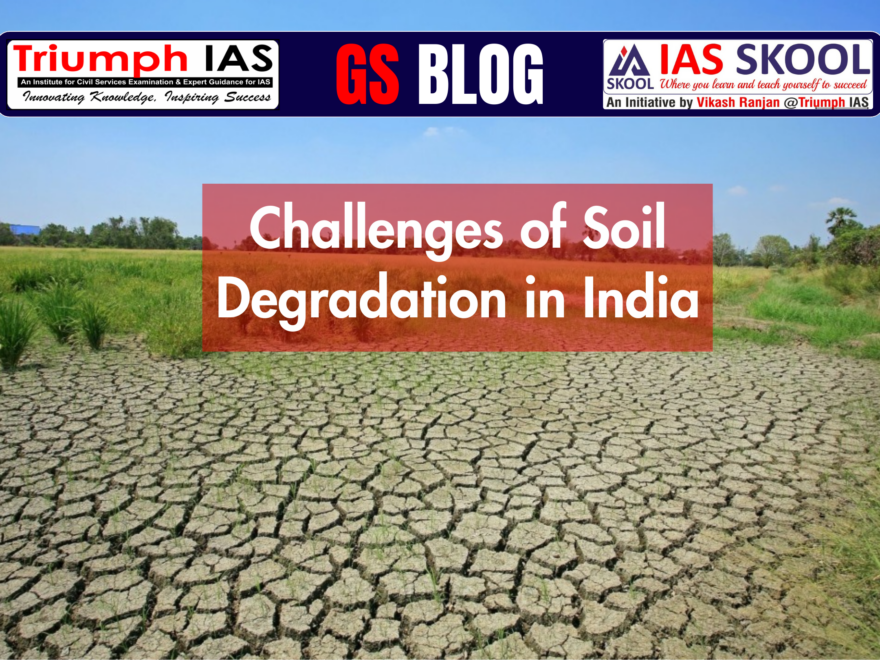Challenges of Soil Degradation in India
India’s agricultural sustainability is under threat due to deteriorating soil health. Studies indicate that only less than 5% of Indian soils possess high nitrogen levels, and just 20% have adequate organic carbon. The existing fertilizer subsidy system, which disproportionately favours urea, has caused imbalanced nutrient application, with excessive nitrogen and insufficient phosphorus and potassium use. This imbalance not only hampers agricultural productivity but also exacerbates environmental degradation.
To secure long-term soil health and agricultural sustainability, comprehensive systemic reforms in fertilizer policies and nutrient management are urgently required.
Current Status of Soil Degradation in India
- Extent of Degradation:
According to the Desertification and Land Degradation Atlas of India (SAC 2021), 97.85 million hectares, or 29.77% of India’s geographical area, experienced land degradation during 2018-19.
- Geographic Spread and Severity:
The most affected regions are semi-arid and dry sub-humid areas, with states like Rajasthan, Maharashtra, Gujarat, and Telengana witnessing significant degradation.
- Rajasthan accounts for over 21 million hectares of degraded land, mainly due to wind erosion in its arid zones.
- Desertification has intensified, with 83.69 million hectares now classified as drylands undergoing desertification—a net increase of over 1 million hectares since 2003-05.
Issues Leading to Soil Degradation in India
- Unsustainable Agricultural Practices:
India’s heavy reliance on intensive farming methods, such as excessive use of chemical fertilizers, pesticides, and mono cropping, has caused severe nutrient depletion and soil acidification.
For instance, states like Punjab and Haryana are experiencing declining organic carbon levels due to the legacy of high-yield cropping from the Green Revolution.
Additionally, organochlorine insecticides like DDT and HCH make up over 70% of pesticides used in India, further exacerbating soil degradation.
- Deforestation and Urbanization:
Rapid deforestation for agriculture, infrastructure development, and urban expansion has significantly accelerated soil erosion and reduced water retention.
From 2013 to 2023, 95% of India’s tree cover loss occurred in natural forests.
For example, the Western Ghats, a global biodiversity hotspot, lost 5% of its evergreen forest cover, impacting local soil fertility.
- Overgrazing and Unsustainable Livestock Management:
Unregulated grazing in arid and semi-arid regions, such as Rajasthan and Gujarat, has led to vegetation loss and topsoil erosion.
With over 535 million livestock, India’s grazing lands are under immense pressure, exceeding their sustainable carrying capacity and resulting in denuded plant cover.
- Water Mismanagement and Irrigation Practices:
Excessive groundwater extraction and inefficient irrigation methods like flood irrigation have led to soil salinization and water logging.
Around 6.74 million hectares in India are affected by salinity, with Punjab experiencing degradation in nearly 50% of its land due to over-irrigation.
Estimates suggest that by 2050, up to 50% of India’s arable land could become salt-affected.
- Industrial Pollution and Mining Activities:
Heavy metals, chemicals, and pollutants from industries and mining activities are contaminating soil ecosystems, especially in states like Odisha and Jharkhand.
For instance, toxic waste from coal mining and fly ash dumps has rendered vast areas unproductive.
The Sterlite Copper plant in Tamil Nadu caused severe soil and water contamination through the discharge of harmful chemicals.
- Climate Change and Extreme Weather Events:
Erratic weather patterns caused by climate change, including floods and droughts, have worsened soil erosion and nutrient loss.
The 2023 Himachal Pradesh floods led to extensive topsoil loss in agricultural zones.
Projections indicate that areas with high or very high soil erosion rates will increase from 35.3% to 40.3% by the end of the century.
- Shifting Cultivation and Slash-and-Burn Practices:
In north eastern states like Nagaland and Manipur, slash-and-burn practices degrade soil fertility by destroying organic matter.
A total of 4,925 km² in Northeast India has been identified as jhuming hotspots, with over 62% in Arunachal Pradesh, Assam, and Mizoram, leading to extensive erosion and biodiversity loss.
- Unregulated Construction and Infrastructure Projects:
Large-scale construction for roads, dams, and urbanization strips topsoil and disrupts natural drainage systems.
For example, the construction of the Char Dham Highway in Uttarakhand has resulted in over 300 landslides, causing significant soil instability.
- Invasive Species:
Invasive plants like Lantana camara are depleting soil nutrients and disrupting native biodiversity.
Recent studies show that invasive species are present in 22% of natural areas and could threaten up to 66% of these areas in the future

Indian Government Initiatives Related to Soil Conservation Remain Partially Effective
- Fragmented Policy Framework:
India’s soil conservation efforts are divided across multiple ministries and schemes, resulting in a lack of coordination and unified focus.
For example, the Soil Health Card Scheme operates independently of complementary programs like the Pradhan Mantri Krishi Sinchayee Yojana (irrigation) and MNREGA (land restoration).
This siloed approach hinders a holistic strategy for soil management.
- Inadequate Implementation and Monitoring:
Although initiatives like the Soil Health Card Scheme and Paramparagat Krishi Vikas Yojana (PKVY) aim to improve soil health, their on-ground implementation faces challenges.
As of 2022, only 33% of farmers reportedly follow soil health recommendations.
Additionally, insufficient accountability and the absence of real-time feedback mechanisms reduce the effectiveness of these schemes.
- Neglect of Regional Specificity:
Many soil conservation programs adopt a generic approach and fail to address region-specific challenges, such as:
- Desertification in Rajasthan,
- Salinity in Gujarat, and
- Waterlogging in Punjab.
This “one-size-fits-all” approach diminishes the impact of these programs on diverse soil conditions.
4. Weak Linkages Between Research and Implementation:
India’s research outputs from institutions like ICAR and IITs are not adequately translated into practical solutions for farmers.
- Technologies like biochar and microbial fertilizers remain underutilized due to a lack of government support for commercialization and field-level adoption.
- This disconnect between research and implementation significantly limits the potential impact of innovations on soil health improvement.
Measures for Effective Soil Health Management in India
- Promoting Sustainable Farming Practices:
Encouraging techniques like organic farming, crop rotation, and agroforestry can enhance soil health by boosting organic matter and microbial activity.
The Paramparagat Krishi Vikas Yojana (PKVY) supports organic farming, but its outreach needs expansion through better farmer training.
Linking PKVY with the Soil Health Card Scheme can provide region-specific, real-time soil health recommendations.
- Promoting the Wadi System:
The Wadi system, a traditional tree-based farming method, integrates agriculture, horticulture, and forestry, ensuring sustainable practices.
It prevents erosion, conserves water, enriches biodiversity, and supports socio-economic empowerment.
Scaling this system can significantly contribute to effective soil health management.
- Improving Water Management Techniques:
- Micro-irrigation methods, such as drip and sprinkler systems, reduce waterlogging and salinization while conserving water.
- The PM Krishi Sinchayee Yojana (PMKSY) should integrate precision agriculture to optimize the water-soil balance.
- Currently, only 19% micro-irrigation coverage exists, leaving vast scope for expansion.
- Enforcing Regulations Against Sand Mining:
- Implementing stricter monitoring and sustainable sand mining policies can reduce riverbank erosion and protect soil ecosystems.
- Technologies like drones and AI, as used in Andhra Pradesh’s sand mining regulation model, can enhance compliance.
- Rehabilitating Degraded Lands:
- Reclaiming land through afforestation, grassland restoration (e.g., Banni Grassland Restoration), and wetland revival can mitigate erosion.
- Aligning programs like the National Afforestation Programme (NAP) with community-led initiatives and MGNREGA can combine ecological recovery with rural employment opportunities.
- Promoting Conservation Agriculture:
- Practices like zero tillage, mulching, and cover cropping improve soil structure and organic carbon.
- The Borlaug Institute for South Asia (BISA) in Punjab promotes zero tillage through technologies like the “Happy Seeder.”
- Expanding these techniques to other regions under PMKSY could increase impact.
- Adopting Bioremediation for Contaminated Soils:
- Bioremediation techniques using microbes and plants can clean soils polluted by industrial waste and heavy metals.
- For example, Gujarat’s Ankleshwar industrial area successfully restored farmland through bioremediation.
- Techniques like adding fish oil to mushroom compost for degrading polycyclic aromatic hydrocarbons (PAHs) have shown promising results.
- Expanding Soil Health Card Utility:
- The Soil Health Card (SHC) Scheme should go beyond distribution by focusing on farmer education and implementation of recommendations.
- Linking SHC data with platforms like the Kisan Suvidha app can deliver real-time advisory services.
- Partnering with local Krishi Vigyan Kendras (KVKs) ensures grassroots-level support.
- Creating Coastal Soil Management Plans:
- Comprehensive strategies, including mangrove afforestation and saline-resistant crops, can address salinity intrusion in coastal regions.
- The National Coastal Mission under the NAPCC should focus more on soil health alongside habitat protection.
- Tamil Nadu’s mangrove restoration model offers a replicable framework.
- Investing in Research and Development:
- Encouraging R&D for soil-friendly technologies, such as bio-fertilizers and advanced soil testing kits, can revolutionize soil health management.
- Collaborations between ICAR and startups can drive innovation.
- For example, integrating biochar production with agricultural waste management could reduce waste and improve soil quality.
- Promoting Urban Composting and Circular Economy:
- Municipal composting facilities can convert urban organic waste into high-quality manure, reducing dependence on chemical fertilizers.
- The Karnataka Compost Development Corporation, which processes 250 tons of wet waste daily, is a scalable model.
- Providing GST rebates on compost sales could further incentivize such initiatives.
- Strengthening Natural Farming Initiatives:
- Natural farming techniques, like the Subhash Palekar Natural Farming (SPNF) model, reduce dependence on external inputs while enhancing soil biodiversity.
- Linking SPNF with local KVKs can promote farmer adoption and better outreach.
- Promoting Integrated Nutrient Management:
- Balanced use of chemical, organic, and bio-fertilizers can address nutrient imbalances.
- Revising the Nutrient-Based Subsidy (NBS) to include bio-fertilizers and fortified fertilizers can enhance soil health.
- Linking NBS reforms with SHC data could provide farmer-specific recommendations.
- Developing Digital Soil Health Mapping:
- Creating a national digital database for soil health mapping can help monitor trends and recommend location-specific solutions.
- Leveraging ISRO’s Earth Observation Satellites can provide actionable insights for precision soil management.
- Tackling Micro plastic Contamination:
- Banning single-use plastics and promoting biodegradable alternatives can reduce micro plastic contamination in soils.
- Incentivizing industries to develop biodegradable agri-plastics could support this shift.
- Strengthening Community Participation:
- Empowering local self-help groups and Panchayati Raj Institutions in soil conservation ensures better outreach and implementation.
- Gujarat’s participatory watershed program serves as an effective model for nationwide expansion.
- Integrating Climate Adaptation with Soil Conservation:
- Combining climate adaptation strategies like afforestation with soil health programs can combat climate-induced degradation.
- Integrating the National Adaptation Fund for Climate Change (NAFCC) with watershed development schemes can create synergies, especially in vulnerable states like Rajasthan.
Tackling soil degradation through integrated and sustainable farming practices, efficient water management, and focused conservation strategies is essential for securing India’s agricultural future. Soil health plays a pivotal role in supporting India’s agricultural economy, with 57% of the population dependent on agriculture for their livelihoods. Moreover, maintaining healthy soils is critical for achieving Sustainable Development Goal (SDG) 15: Life on Land, ensuring long-term agricultural productivity, food security, and environmental sustainability.
The End of the Blog: Challenges of Soil Degradation in India

|



















One comment